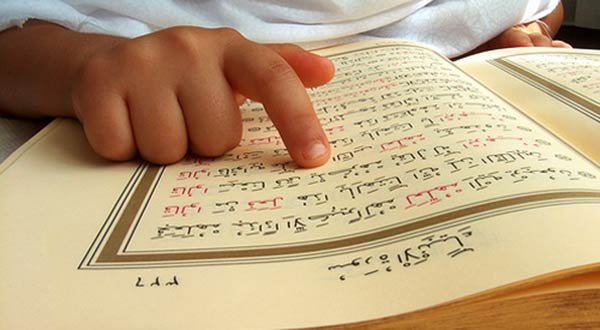The Qur’an (5:101-102), states: “O those who believe, do not ask about things which, if disclosed, may displease you; and if you ask about them when the Qur’an is being revealed, they will be disclosed to you. Allah has pardoned you for it. And Allah is Most Forgiving, Forbearing. People before you have asked such questions, then became disbelievers because of it.”
Allah forbids His servants from asking unnecessary and useless questions for which if an answer is sought, it might be difficult for them to adhere to it and they will be sorry afterwards that they had asked the question. It is also recorded in a hadith: “Allah has ordained some obligations, so do not ignore them; has set some limits, so do not trespass them; has prohibited some things, so do not commit them and has left some things without rulings, out of mercy for you, not that He forgot them, so do not ask about them.” (Sahih Bukhari)
“And if you ask about them when the Qur’an is being revealed, they will be disclosed to you.” i.e. if you ask questions about things which are not yet revealed or you have been forbidden from asking them, then these things will be made plain to you by His revelation. “Allah has pardoned you for it. And Allah is Most Forgiving, Forbearing.” i.e. Allah has forgiven those who asked such questions before this prohibition, and surely He is Forgiving and Most-Forbearing.
We know how the Jews asked too many questions when they were ordered to slaughter a cow. They were not given any conditions initially, and as such, slaughtering any cow would have been good enough. However, they asked for a description, and then details of that description. With every question, the choice before them was narrowed down and the task became harder. As narrated in Sahih Muslim, the background or the cause of the revelation of these ayaat is as follows. Some people used to put numerous questions to the Messenger of Allah (peace and blessings of Allah be to him) asking him about matters on which no order or prohibition had been given. Some were always asking about the details of matters that the Qur’an gave in general terms, to make them easier for people. Some asked about matters which need not be exposed, because exposure would cause a problem either to the person putting the question or to others.
Imam Ahmad recorded that Ali said, when the ayah concerning the obligation of Hajj, “And Hajj to the House is a duty that mankind owes to Allah, those who can bear the journey” (3:97) was revealed, they asked, “O Allah’s Messenger! Is it required every year?” He did not answer them, and they asked again, “Is it every year?” He still did not answer them, so they asked, “Is it every year?” He said, “No, and had I said ‘yes’, it would have become obligated, and had it become obligated, you would not be able to bear it.” Allah sent down, “O you who believe! Ask not about things which, if made plain to you, may cause you trouble.’’ (At-Tirmidhi and Ibn Majah) After that, he added: “Things, about which I give you no command, leave them as they are. Do not ask questions by digging and prying into them. Your established routine should be: Do what I order you to do, with the best of your ability, and leave what I order you not to do (that is, do not dig and pry into things about which no injunctions are given).”
Prophet Muhammad said: “One of the qualities making someone a good Muslim is that one leaves what is unnecessary.” This tells us that many of our Muslim brothers who keep investigating into unnecessary subjects, such as, the name of the mother of Prophet Musa or the precise length and breadth of the Ark of Nuh, indulge in what has no effect on one’s conduct in life. We often come across such irrelevant discussions particularly among our elite and intellectual people. Asking such questions is blameworthy – especially when it is already known that people who tend to ask such questions are mostly unaware of the basics of their religion.
The problem is that falling for what is wasteful invariably results in making one stay deprived of doing what is necessary. It is also a part of Islamic teachings that one should not indulge in any activity, whether intellectual or practical, a task or a conversation, and waste precious time through it, unless there is some gain to be made from it in terms of the worldly or other life.
The Qur’an is teaching Muslims, through the quoted ayah, how and when to put their questions, demarcating the boundaries of investigation and the system through which to acquire knowledge. Since Allah is the source of the Islamic code and the One who reveals what is unknown, it is only good manners that His servants should leave it to His wisdom whether to provide details of the legal provisions or to state them in general terms only, and whether to inform them of what is unknown to them or keep it hidden from them. It behoves them well to stop at the limits determined by Allah Whose knowledge encompasses all things. It is wrong that we should try to seek to know things that lie beyond the reach of our powers of perception when Allah has determined not to reveal these to us. Our attempts are bound to be fruitless, for Allah knows well the limits of human power and potential. He gives us the law that suits us, revealing only that measure of knowledge with which we are able to cope.
The ahadith quoted above, together with statements in the Qur’an, outline the Islamic system of pursuing knowledge. The first point is that, from the Islamic point of view, knowledge should be sought to face a real need and to satisfy that need. Human powers and faculties are too precious to expend in pursuing detailed matters of what Islam calls ghayb, a term which refers to what lies beyond the reach of human perception. That is because such knowledge is not sought to meet any real or practical need in human life. It is sufficient for the human mind to believe in that ghayb as described by the One who has described it. When the human mind goes beyond that belief in order to investigate its nature and details, it will not attain any true results, because it is simply not equipped with the necessary faculties to achieve that knowledge. Allah has given us all that we need to know about it. Any further pursuit is a waste of effort; it is no more than trying to walk in the desert without a guide. It is bound to end in total loss. As for Islamic rulings, these are sought when needed, to face practical situations as and when these take place. This is the proper Islamic approach.


